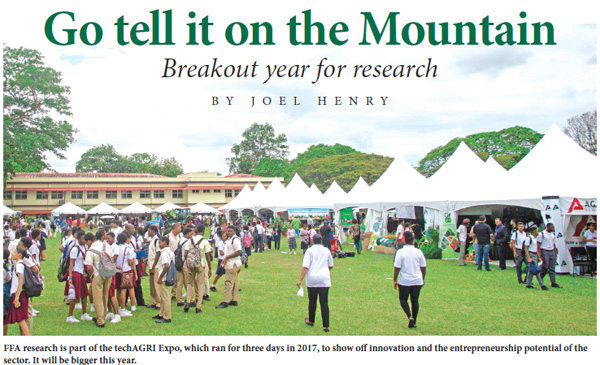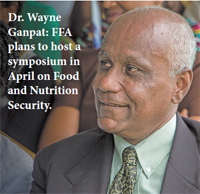 |
 |
 |
|
February 2018
|
His statements could be a manifesto for the entire region. There is a growing consensus on the need for a new Caribbean agriculture. The region needs an agriculture sector that can address its massive food import bills (estimated at over $4 billion in Trinidad and Tobago in 2014 alone). It needs to revitalise agriculture-driven economies and increase diversity in others. It needs greater resiliency in the face of disasters such as the devastating hurricanes of 2017. It needs to compete and win. Mindful of this, researchers at UWI St. Augustine’s Faculty of Food and Agriculture (FFA) have dedicated their efforts to finding solutions for a Caribbean renaissance in agriculture. Their work is pregnant with potential: microorganism-based pest and disease controls, using earthworms in the development of organic fertilisers, systems for supporting farmers after natural disasters, and much more. Researchers from the FFA are currently working on most of the most pressing issues affecting food, farming and the business of agriculture. “We are the premier agricultural research organisation in the region,” says Dr. Wayne Ganpat, Dean of the FFA. “The faculty does a lot of work.” In 2018, Dr. Ganpat and the FFA’s focus will also include greater outreach: “We have a lot to contribute to solving the food security issues in the region. I want people to know they can come to us. On the other hand we have to go out there and make a more coordinated effort to find the research needs. At present we discern them. We look at government policies throughout the region and we try to understand them and respond. But we can do better.”
“We have a great deal of research but not enough outreach,” he says. “Outreach is a major need. We have close to half a million farmers throughout the region. Then think about all the people who depend on farming for their livelihood. It could be a couple million. Who is going to get this research out to them?” In November 2017, the FFA held a Research Day on the St. Augustine Campus to highlight the work of the Faculty. They also published the “Faculty of Food and Agriculture Research Digest,” which includes abstracts and summaries of 100 projects being undertaken by staff and students. FFA research also forms part of the techAGRI Expo. First held in March 2017, this three-day event highlights the innovation and entrepreneurship potential of the sector. “TechAGRI will happen again this year on an even bigger scale,” Dr. Ganpat promises. He sees a major part of the FFA’s role as advocacy for agriculture, which has been stigmatized as hard, low-tech labour. Through research, not only can new labour and cost-saving technologies and processes be implemented, a new type of food production professional can develop. “Farmers in the region can produce very well. What we need is to get agriculture to the next stage; to add value,” he says. “We need to market our industry properly. We need to make new products from our produce. That’s what our students should be focusing on. Our students should be getting involved in the stages beyond production.” And beyond outreach and public awareness, Dr. Ganpat recognises the need to get the FFA’s research into the hands of the decision-makers: “We have to start producing policy briefs. We must get our work into the hands of the ministers of agriculture and permanent secretaries in readable form. That’s the next step. We can take published research and make it presentable to the policymakers.” He adds: “I liken it to when you see vendors selling those bottles of huge grain nuts on the highway. You buy it and when you go home and shake it nothing comes out. We have all this research and not enough of it is getting past that bottleneck. We have to explode the bottleneck.”
Research to watchUWI is brimming with research that can bring new and much needed innovation to the agriculture sector. Most of it comes from the FFA but outstanding work is also being done in other faculties such as Science and Technology and Engineering. Some of the most potentially impactful work is funded through the UWI-Trinidad and Tobago Research and Development Impact Fund (RDI), although there are many amazing projects that use different funding mechanisms. Organic answers to healthy crops How do we produce robust, bountiful and disease-free crops without the use of pesticides? This is the question that informs the work of the Agriculturally Important Microorganisms (AIMs) project. AIMs has done incredible work in developing bio-fertilisers and pest and disease controllers. Look for major announcements on the team’s results this year and the development of commercial opportunities for their use. Worm fertilizer “Vermicomposting” is the term for using worm manure, among other materials, to create powerful fertilisers in organic farming. An FFA team is working to assess the suitability of Trinidad earthworms for vermicomposting and their findings show that local species are actually better for local soil. This is a promising breakthrough for the development of local organic farming. Bringing citrus back Once upon a time Trinidad was a major producer of citrus fruits. The UWI intends to make that time come again. The FFA has established an eight-acre citrus orchard at the South Campus, using advanced design, technology and processes. The goal is to revive this once great industry and make a dent in the over $50 million import market for frozen citrus concentrate. Apps for agriculture
|

 In January 2018, the Government of Barbados launched a national food planting programme. At its launch, Chief Agriculture Officer, Lennox Chandler, said Barbadians needed “to be in control of what they eat, in terms of how it is grown, what it is used to produce and they should be able to feed themselves from within the four corners of the island in case some catastrophe occurs….”
In January 2018, the Government of Barbados launched a national food planting programme. At its launch, Chief Agriculture Officer, Lennox Chandler, said Barbadians needed “to be in control of what they eat, in terms of how it is grown, what it is used to produce and they should be able to feed themselves from within the four corners of the island in case some catastrophe occurs….” Appointed Dean in August 2016, Dr. Ganpat is well-suited to the task of bringing the Faculty’s research out of the laboratory and into the farming fields and policy offices. Both his academic and professional careers are based in agricultural extension, the transfer of research through education and outreach to farming communities. He is essentially a Dean and communications expert rolled into one.
Appointed Dean in August 2016, Dr. Ganpat is well-suited to the task of bringing the Faculty’s research out of the laboratory and into the farming fields and policy offices. Both his academic and professional careers are based in agricultural extension, the transfer of research through education and outreach to farming communities. He is essentially a Dean and communications expert rolled into one.
 AGRINETT is an award-winning research project that consists of a full suite of smartphone applications for farmers and other players in the agriculture sector. RDI-funded, the project was developed by the Department of Computing and Information Technology in collaboration with the FFA. Not only has AGRINETT developed powerful technology tools for the sector, the team is actively in the field introducing the apps and training communities in their use.
AGRINETT is an award-winning research project that consists of a full suite of smartphone applications for farmers and other players in the agriculture sector. RDI-funded, the project was developed by the Department of Computing and Information Technology in collaboration with the FFA. Not only has AGRINETT developed powerful technology tools for the sector, the team is actively in the field introducing the apps and training communities in their use.